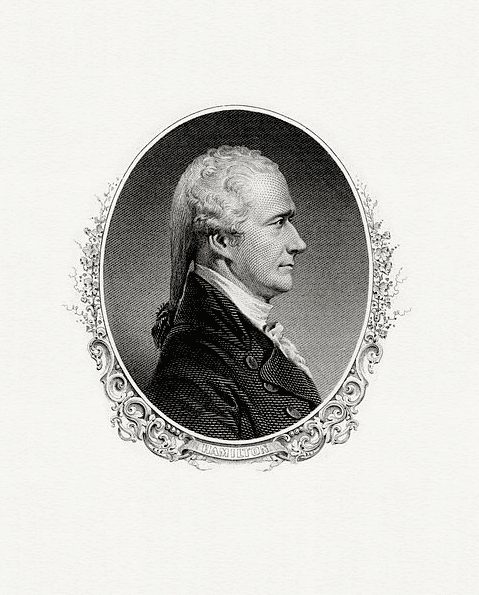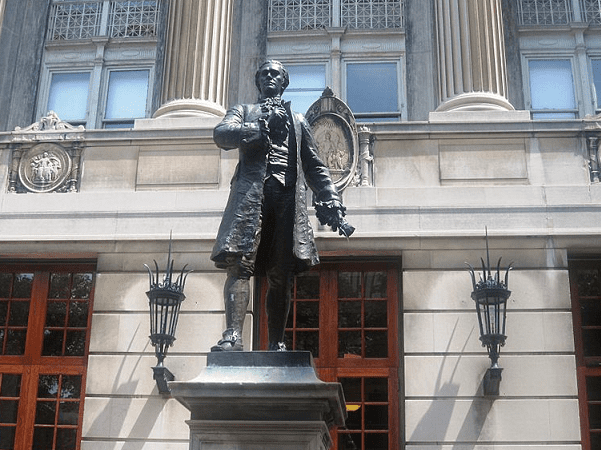The United States was founded by a group of remarkable men, colloquially referred to as the nation’s “Founding Fathers.” One of the most active and brilliant of these men was Alexander Hamilton, who died on 12 July 1804 after being shot in a duel with his nemesis, Vice President Aaron Burr, the day before. Hamilton was only 47 years old (or 49 – his birthdate is uncertain).

This Founding Father, who had such a productive and successful career, began his life in humble circumstances and with much hardship. Hamilton was born out of wedlock to Rachel Faucette on the Caribbean island of Nevis, probably in 1757. His father, James Hamilton, abandoned the family (Alexander had one brother). Then his mother died of yellow fever in 1768 when Alexander was only 11. He and his brother, James Jr., were taken in by a cousin – who committed suicide the next year.
Yet Alexander Hamilton went on to become one of the most important men in the newly-forming United States of America. He was the senior aide-de-camp to General George Washington during the Revolutionary War. He was appointed the nation’s first Secretary of the Treasury during Washington’s first administration. Other highlights of his career included being elected to the Continental Congress, founding the Bank of New York, authoring many of the Federalist Papers, establishing the U.S. Coast Guard, working to end the international slave trade, and being appointed Commanding General of the U.S. Army by President John Adams in 1799, succeeding George Washington. Hamilton was a military officer, author, politician, lawyer and banker, successful in all his pursuits.

When Alexander Hamilton’s life was ended by a bullet from Aaron Burr, the United States lost one of its leading figures and brightest lights. The nation’s public – and press – mourned. The following newspaper article is a good example.
Here is a transcription of this article:
NEW-YORK, July 13.
DEEP LAMENTATION.
Died Yesterday afternoon, GENERAL ALEXANDER HAMILTON, of a wound which he received on the morning of the preceding day, in a duel with Col. Burr. Never was a death more sincerely and justly lamented; and his loss will be sensibly felt throughout the United States. – In him were united the most splendid talents and the strictest political integrity. There was no man more universally beloved by those who knew him, and in whom such unbounded confidence was placed. The circumstances which occasioned the melancholy event of his death, and deprived this country of its first citizen, will no doubt be fairly and fully stated; the public voice demands it; his character will be drawn; and his name go down with the highest honors to all posterity. The General, during his short illness [i.e., dying from the gunshot], expressed his strong abhorrence of the practice of duelling [sic], and has left in writing (as is said) his testimony against it; he partook of the holy sacrament; and died in the explicit profession of his belief in the Christian religion, and a declaration that he had “a tender reliance on the mercy of Almighty God, through the merits of the Lord Jesus Christ.” The ships in the harbour [sic] will show the respect which is due, the merchants are recommended to shut up their stores, and the citizens attend the funeral of one of the greatest and most beloved of men.
______________
At a numerous and respectable meeting of Merchants and other citizens of New-York, at the Tontine Coffee house, last evening, Mr. Wm. W. Woolsey was called to the chair, and Mr. Maturin Livingston appointed Secretary.
The Meeting having been informed of the melancholy event of GENERAL ALEXANDER HAMILTON’s decease, and being deeply sensible of the irreparable loss which the United States have sustained by the death of a man, whose public and private virtues have endeared him to his friends and acquaintances; whose patriotism, talents, integrity, and eminent services, have rendered him peculiarly valuable to his country; and being anxiously desirous to render to so great and distinguished a character the last tribute of respect in their power,
Resolve, That this meeting will unite with their fellow-citizens of all classes in every suitable demonstration of regret for the death of General Alexander Hamilton. – And that, for this purpose, they recommend to the citizens at large, to shut up their stores, and generally to suspend business on Saturday the 14th inst. [i.e., this month] and to assemble at the house of Mr. CHURCH, in Robinson-street at ten o’clock in the forenoon, to form a procession to attend the remains of the deceased.
That it be recommended to the owners and masters of vessels to direct the Colours [sic] of all the Vessels in the harbor to be hoisted half mast, during the whole of Saturday next.
Note: An online collection of newspapers, such as GenealogyBank’s Historical Newspaper Archives, is not only a great way to learn about the lives of your ancestors – the old newspaper articles also help you understand American history and the times your ancestors lived in, and the news they talked about and read in their local papers. Have you been able to trace any of your ancestors back to the time of Alexander Hamilton? Please share your stories with us in the comments section.
Related Article:
